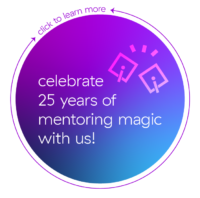As an outgrowth of iMentor’s commitment to diversity, equity and inclusion, iMentor launched its new Mentor Education Program this week across all four regions. “We are asking all mentors to make a commitment to learning and reflection around equity and education topics as a core part of their volunteer experience at iMentor,” said iMentor CEO Mike O’Brien.
The Mentor Education program consists of online, self-directed Monthly Learning Moments (MLMs) designed to spark reflection about how issues of identity and race play out in our day-to-day lives, including our relationships. iMentor will also offer mentors the opportunity to come together—both in-person and online—to discuss that month’s learning.
“We believe this is an essential experience for all mentors,” said O’Brien. “The Monthly Learning Moments offer mentors a chance to explore their own connections with the social structures that impact the day-to-day lives of our students.”
According to Kelli Doss, iMentor’s Chief Talent & Equity Officer, the development of the Mentor Education Program has been a long time in the making, and connects to a key commitment in iMentor’s five-year strategic plan. “As part of our plan, we put a stake in the ground around investing in our mentor community, and this work is an important part of that,” said Doss. “We know that mentees benefit from mentors who are learning and growing alongside them, but this work is also for our mentors, who have told us that one of the biggest things they get from our program is a greater awareness of the challenges around equity in education. The Mentor Education Program aims to give mentors more tools to support their own growth, development and engagement.”
To develop the Mentor Education Program, iMentor partnered with The Perception Institute, a consortium of researchers, advocates and strategists who translate cutting edge mind science research on race, gender, ethnic, and other identities into solutions that seek to reduce bias and discrimination, and promote belonging. “A lot of our work focuses on deepening people’s understanding around three key topics: implicit bias, identity anxiety (or racial anxiety) and stereotype threat,” said Aya Taveras, Associate Director for Programs at Perception Institute.
“We really wanted the Monthly Learning Moments to be something that people could take something from and see themselves in,” Aya said. “So, to that end, we thought about the ways to make the content that we talk about all day, every day, a lot more fun and accessible no matter who you are -- whether you've had this conversation 53,000 times or you are someone who's very new and likely a little bit nervous about the introspection required to think about how implicit bias may be showing up for you.”
Both Taveras and Doss shared that the size and diversity of iMentor’s 10,000+ mentor community posed a challenge in developing the Monthly Learning Moments. “We were really conscious of not ‘centering’ whiteness,” Doss said. “For one thing, our mentor pool is really diverse, so examples that are predominantly about white people wouldn’t speak to a lot of people. Additionally, it’s really difficult to disrupt white dominant culture if whiteness is centered, which is to say, if we prioritize the comfort of white folks in conversations about race.”
The development of the Mentor Education Program represented an ongoing dialogue between the team at the Perceptions Institute and several teams at iMentor, including iMentor’s Diversity, Equity and Inclusion core team.
Many members of the MLM development team shared that they experienced personal growth as a result of developing content that both mentors and all iMentor staff will work through on a monthly basis throughout the school year.
“Even though the Monthly Learning Moments are short, I do think they are rich,” Doss said. “You could go through them a few times and get something new each time. I hope that they will help our mentor community grow in the same way that I saw our DEI core team grow while working to develop this content—especially in confronting the reality of white dominant culture and how pervasive it is. I know we personally changed and developed in the process, and I think that’s a really good sign about what we’ve produced. I’m so excited to share it more broadly.”
The first MLM is called ‘Welcome to Our Brains on Race’ and is currently being shared with mentors across regions.
